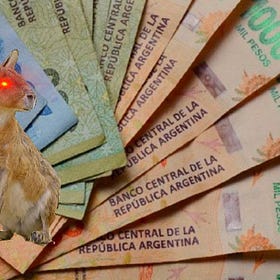Massa's Digital Peso: Dystopia Coin
How close is Argentina to a CBDC?
Welcome Avatar! Little has been said about Sergio Massa’s mention of launching a CBDC in Argentina if he is elected. How far is this project, and is this even feasible in an economy that runs primarily on cash payments? Let’s dig in.
During the presidential debate in October right before the first round of the general elections, candidate Sergio Massa (who is also Argentina’s current Minister of Economy) suddenly dropped the following statement:
"We are going to launch the Argentine digital currency. […] just as your children use their platform economy while transacting on their cell phone or creditcard, we are going to implement this globally for all of Argentina.
[This digital currency] will be accompanied by a new laundering law that allows those who have money abroad to bring it and use it freely without having to pay additional taxes.”
Furthermore, according to Massa, the government would grant tax exemptions to those who use this digital currency, and prison for tax evaders and people who offshore money without letting the local tax authorities know about it.
A project by economist Carlos María De Los Santos
On August 3, deputies of Frente de Todos (now called Unión por la Patria) Juan Manuel Pedrini, María Luisa Chomiak, and Aldo Adolfo Leiva, presented a draft resolution that seeks to declare a Digital Peso of interest to the Chamber of Deputies.
The resolution reads as follows:
The prestigious accountant and economist [referring to Carlos María de los Santos] who has brought us together to reflect on the new economic, social and cultures that the new technological era entails.
He proposes to launch the Argentine Digital Peso. This publication brings together all sectors, laymen and specialists to discuss what will become of the economy when the physical bills disappear that we know as the currency until today.
He investigates the benefits of using virtuality for economic transactions of small or big transactions, taking into account both large and small consumers.
He raises relevant issues such as the end of tax evasion given that the transactional operations are fully recorded, by having proactive banks that defend the savings and provide accessible credit to finance the real economy.
Carlos María de los Santos seems to be the main man behind most of the digital peso endeavour.
He is a former director of the Nuevo Banco del Chaco and president of the Fundación Inclusiva Productiva, which created the PAD (Digital Argentine Peso) — not linking to the foundation’s website since it appears to be hacked and is linking to a random Chinese marketplace.
Comforting thought that these people are the thought leaders behind the local CBDC, while they can’t even take care of basic Wordpress security.
According to Carlos, the main objectives of the Digital Peso are as follows: eliminate physical bills and coins in circulation, and force all operations to be made through the financial system.
He confirmed that the goal is to push Argentina into becoming a cashless society on numerous occasions, and when asked if the Digital Peso would be the only coin in town, he responded:
Yes, it would be absolutely [cashless]. When the law comes out, it will give you a period of 30/40 days to take your cash to a bank account and from there make your transactions digitally.
And why would Carlos be interested in that? He explains:
“From a financial point of view, collecting nothing more than this unused money in the pockets of Argentines, would allow us to have financing of no less than 30-35% of GDP.”
Yes, the story as old as time: spending more.
Feasibility
After the debate Massa reiterated in radio interviews that he “will soon file a law that creates the Argentine digital currency because there are more than 100 countries that are already doing it”.
The minister said that Norway and Sweden are the known and successful models in terms of implementing a digital currency, and noted that countries like Brazil are already implementing a CBDC in the region.
Looking at the countries mentioned however, Sweden and Norway have a proof of concept for their CBDC, which is a far cry from actually using it in practice for day-to-day payments.
Brazil is in the initial stages of the DREX proof of concept as well, but seems to be moving faster than the other two countries mentioned by Massa with regards of implementation.
The law Massa wants to file will be “the beginning of a policy program aimed at evolving the current retail digital payment system in which fintech, commercial banks and clearinghouses participate under the supervision and regulation of the BCRA.”
So his idea is that many of the current digital payment systems like Mercadopago, Ualá and others will serve as a gateway for the CBDC usage, just like this Patagonian rabbit predicted a few months back.
Autist note: read more about the CBDC threat in the Southern Cone here:
Individual Sovereignty in the Age of Cashless Societies
Welcome Avatar! Do you want to live in a place where you need to request permission to build a shed in your own backyard, or do you prefer a country like Paraguay where you can still drive around without license plates or car insurance? The choice is yours, anon, but for how long? Let’s dive in.
The Ministry of Economy explained that it is a program that has two stages: first the existing ecosystem will be strengthened and then progress will be made to create a “new infrastructure provided and supported by the Central Bank”, generating capacities to issue a digital or virtual currency only.
Basically, Massa loves the kind of digital prison a CBDC creates and would like to implement this asap. If his track record of cracking down on cuevas is any indicator for his thirst for more control over the money market in Argentina, we’re in for quite the dystopian future if he is elected.
Bright sides?
If an Argentine CBDC would be implemented, it would allow the Central Bank to replace paper money and basically do away with the privacy cash payments provide.
As mentioned in previous articles, Argentina lives on cash and its vast grey market, with estimates of this being at least 40-50% of the economy. In practice, it is impossible to switch 100% over to a digital currency when such a big chunk of the economy operates on cash.
As previous projects such as the eNaira in Nigeria have shown, adoption can be very slow even if authorities make sure that cash is less available. In the case of Nigeria it backfired spectacularly.
Riots and unrest ensued right after the implementation due to cash shortages, and Nigerians demanded renewed access to paper money, despite government incentives. I do not expect this to go any different in Argentina.
Still, let’s assume Massa files his law, it gets approved, and cash is abolished after a certain time period. What would happen almost automatically if nothing else changes in terms of fiscal pressure or commerce regulations? New parallel markets and circular economies would emerge pretty quickly.
These would either use cash dollars (until the Fed also goes cashless those cash Benjies will still be used extensively), stablecoins, and Bitcoin etc. This is the exciting counter part of a CBDC in Argentina: it would be the biggest experiment yet.
Furthermore: properties are priced and paid in cash dollars, which is something that is unlikely to change any time soon.
The real thing to look out for when Massa files his CBDC project law, is to see if it contains a forced conversion for all transactions into the Digital Peso. That would be the most dystopian scenario where property can still be priced in dollars, but in order to buy a property, those USD bills would first have to be converted to Digital Pesos.
Knowing the local market, that would be a recipe to create a shadow market even quicker, or to make sure not a single property is sold from that moment onwards. Only time will tell.
But, anon: fear not. As we have seen time and time again in the past, where there’s a new prohibition (like buying dollars), a new market arises in Argentina.
I don’t expect a CBDC scenario to provide any different outcome.
See you in the Jungle, anon!








Good write up. As a matter of survival and keeping the economy going, there is no way the Argentine economy could handle 100% fully adapting a CBDC. It would mean having to comply with the insane tax burden, among other red tape. So much of the economy works because it is "en negro". It is a strange parodox where if all businesses complied with all the rules, taxes, etc, they would go under, so this incentivizes the "en negro" free market type activities, which keeps the economy afloat. Argentines would work around the CBDC fast.
Frustrating to see these totalitarian trends making their way to the southern cone, ensuring this pointless game of cat and mara continues... but as you say (in other words!), "hecha la ley, hecha la trampa" / "as regras são feitas para serem quebradas"